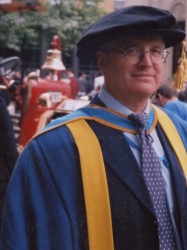Overview of research funding
- at Research Center Juelich/University of Duesseldorf
Alexander von Humboldt Fellows (2), 2 year Minerva Fellows (2), TUM PhD fellow (1), DAAD Fellows (2), DFG standard 3 year grant (1), 3 year DFG Schwerpunkt Grant (1), 3 year BMWi PhD studentship (1), 3 year International Bureau Grants (2), 3 year Volkswagen Grant (1).
- at Imperial College
5 year Wolfson Research Merit Award (2002-2007) - „blue sky‟ research
3 year EPSRC grant “Physical mechanisms of DNA interactions and recognition of homologous genes.”
1 year EPSRC Adventure grant “Towards optical molecular tea spoon” ( a part of the a bigger project "Making molecules that work".
3 year Leverhulme Trust grant “Electrified liquid interfaces: structure, dynamics, functioning”
3 year Leverhulme Trust grant “Molecular Scissors”
Two 6 months Leverhulme Visiting Professor Grants (The Leverhulme Trust) for hosting Profs. (i) A. M. Kuznetsov and (ii) R. Colby
3 year EPSRC-NSF International Cooperation in Chemistry grant: “Ionic-liquid in confined environments: experiments and simulation”
3 year EPSRC grant (with UCL): “Chiral theory of DNA supercoiling”
3 year transatlantic HFSP grant (Imperial, UCL, FU Amsterdam& Baylor Medical College): “Chiral effects in DNA supercoiling”
DSTL grant – “Ultra sensitive sensors”
3 year EPSRC grant "Electrotuneable molecular Alarm"
3 year Commission of European Communities Grant "Ultrasensitive plasmonic detection of single nanoparticles (Nanodetector)"
2 year Commission of the European Communities Grant "Smart Optical Metamaterials: A route towards electro-tuneable fast-reversible self-assembly of nanoparticles at controlled electrochemicial interfaces"
1.5 Year grant (MIT-Imperial Seed Fund) "Physics of solvent-in-salt liquids for energy"
3 year Leverhulme Trust Grant (Co-I, F.Bresme PI) "Electrotuneable Nanoscale Friction: from full stall to superlubricity"
1 year EPSRC Impact Acceleration Grant " Nanophotonics for enhance performance of light emitting devices.
3 year Leverhulme Grant " Unlocking the mystery of homologous gene recognition using model protocells"
Research achievements

Chemical physics and physical chemistry
Nonlocal electrostatics with applications to electrochemistry, physical chemistry, charge transfer kinetics and biophysics.
Modeling the nonlocal dielectric response of water and aqueous solutions and understanding solvent-solute interactions.
New model of proton transport in water and polymer electrolyte membranes
Electrochemistry
Electron theory of electrochemical interfaces: electrical and optical properties.
Theory of space-charge determined phenomena in solid electrolytes.
Theory of electrified liquid-liquid interfaces (interfaces of two immiscible electrolytic solutions): structure, dynamics, functioning.
Theory of the double layer on rough solid electrodes.
Statistical theory of field-induced surface reconstruction and roughening transitions at single crystal electrodes.
Theory of the double layer in ionic liquids, at electrified interfaces and in nanoconfinement.
Structure and kinetic phenomena in ionic liquids and solvent-in-salt systems.
Discovery of a new, electrochemically-based ultra-low-voltage electrowetting system for electrovariable optical applications.
Nanoscience
Theory of STM noise caused by surface diffusion and other sources of fluctuations.
Explanation of the temperature and length dependence of conductance of chain molecules and discovery of a new principle of electrochemical single-molecule-based rectifiers.
Nanophotonics
Electrochemical Photonics: principles, theory and experimenetal realisation of self assembling electrontuneable plasmonic metamaterials at electrochemical interfaces.
Biophysics
Theory of interaction, recognition and aggregation of helical biomolecules in solutions.
Discovery of a mechanism of recognition of homologous genes in protein-free environment.
Energy research
Models of the structure and function of fuel cell electrodes, membranes and whole cells.
Theory of electrical properties and principles of operation of supercapacitors with low dimensional, nanostructured electrodes
Current Areas of Research

(i) DNA-DNA homology recognition in protocels
(ii) New (field-theoretical) approach to the theory of the electricial double layer in aqueous electrolytes
(iii) Electrochemically gated single molecule diodes
(iv) Electrochemical photonic metamaterials
(v) New reverse-electrowetting scenarios for electroactuators
(vi) Ion clustering phenomena in ionic liquids (structure and dynamics)

